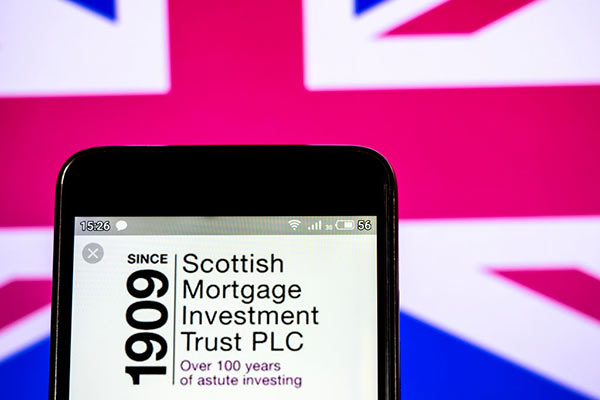Scottish Mortgage: expect volatility – it’s essential to our success
Manager Lawrence Burns argues that world-changing companies do not follow a smooth path to riches. Sam Benstead reports.
24th October 2023 10:00
by Sam Benstead from interactive investor

Volatility is a common measure of investment risk, but Scottish Mortgage (LSE:SMT) manager Lawrence Burns argues that it is a vital part of delivering long-term returns and an expected part of the way that he manages money.
Burns told investors at the Association of Investment Company’s annual Investment Company Showcase that Scottish Mortgage is and should be a volatile trust.
- Invest with ii: Trade Investment Trusts | Cashback Offers | Open a Trading Account
He said: “We are investing in companies that are not going to have smooth journeys and are going to be bumpy in this particular environment that is out of favour, but in the long run it is these companies that are going to deliver real change. Whether you look back at Tesla, Apple or Amazon, none of those companies had a smooth journey and these are the types of companies that we own and think deliver long-term returns.”
Burns said that despite volatile share prices, there is a lot of progress being made in new technologies where the trust is invested.
“Share prices have fallen, but core underlying technology trends have not slowed. Batteries are still getting cheaper, genomic sequencing is still getting cheaper and computers are still getting more powerful. But not only have these trends not stopped, but the trends in computing are actually accelerating thanks to artificial intelligence,” he noted.
- Nvidia and Scottish Mortgage hit by ban on chip sales to China
- Are these the only two funds DIY investors need to own?
This will buoy suffering Scottish Mortgage investors, who are nursing an 11% share price loss this year, which follows on from a 40% crash in 2022.
The trust’s share price over the past five years resembles a steep mountain, with huge gains in 2020 and 2021 coming before big losses in the past two years.
Rather than a steady climb upwards, investors are being taken on a roller-coaster ride by the trust, which attempts to find companies that can deliver transformational change in their industries.
One of the causes of volatility currently, as well as the near 20% discount on the trust, is doubts around the true value of its unlisted investment portfolio, which sits at about 30% of the trust’s assets, its maximum limit.
- Attempting to time the market costs UK investors 7% of their annual returns
- Fund managers’ biggest concerns and reasons to be cheerful in uncertain times
Burns sought to reassure investors that the unlisted assets are regularly and fairly valued, but admitted that it was impossible to please everybody.
He said: “It is always difficult to dissect exactly why a discount exists. There has been a degree of scepticism about private assets in general and how they are valued. Different people have different valuation processes and update times, which can make people wary of whether falls in public equity markets are reflected in private assets.
“We have spent a lot of time in the last 18 months trying to show people the data points and show that we are trying to reflect markets, but at the same time you can’t convince everyone always.”
- Fund Battle: Vanguard global ETF versus BlackRock global ETF
- The ‘hidden winners’ of AI that the pros are backing
The trust also recently released more data about the financial performance of its unlisted stock portfolio. It calculated that its 10 largest private companies had gross profit margins of 38% in the 12 months to June 2023, while revenue growth among this group was 38% on average.
China was another topic on the agenda because Scottish Mortgage has been cutting its exposure there. Burns admitted that mistakes were made when investing in the region.
He said: “One of our mistakes was that we were slow to recognise the geopolitical tension and therefore risk between the US and China, and changes to the regulatory environment.”
In response he said that Scottish Mortgage was “raising the bar” on its China investment.
“It is not saying that we will not invest anything in China, but instead want to make sure we are sufficiently compensated for geopolitical risk.
“We want companies that will give us bang for our buck in terms of risk. We reduced our China investments to recognise some of the risk, but still have a number of holdings where we think the risk/reward remains attractive,” Burns said.
These articles are provided for information purposes only. Occasionally, an opinion about whether to buy or sell a specific investment may be provided by third parties. The content is not intended to be a personal recommendation to buy or sell any financial instrument or product, or to adopt any investment strategy as it is not provided based on an assessment of your investing knowledge and experience, your financial situation or your investment objectives. The value of your investments, and the income derived from them, may go down as well as up. You may not get back all the money that you invest. The investments referred to in this article may not be suitable for all investors, and if in doubt, an investor should seek advice from a qualified investment adviser.
Full performance can be found on the company or index summary page on the interactive investor website. Simply click on the company's or index name highlighted in the article.